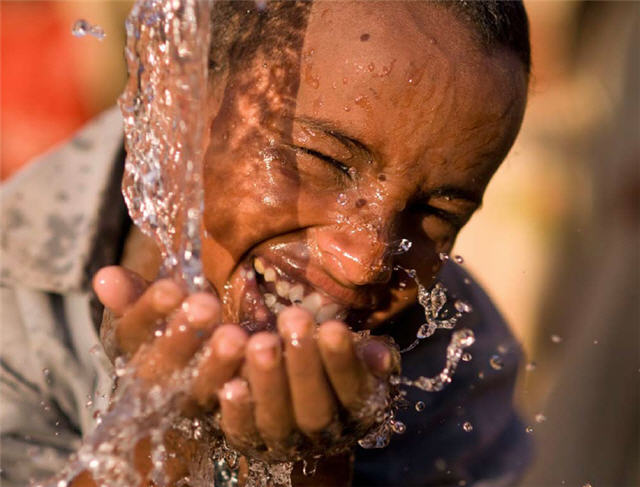Revolutionary Devices to Change the Culture of Water Management in MENA: Water Protests (Lebanon, Morocco and Mauritania)

The regimes not do not articulate policies in terms of people`s rights to access to clean and safe water, but follow neoliberal policies, that are motivated by profit.
This is despite legislative systems and laws in those countries that stipulate that water is public property and may not be privately owned or disposed of. However, those texts lack implementation on the ground, and privatization policies which have given rise to popular protests, rejecting the violation of the human right to freely access water. This violation was among other factors that contributed to popular revolutions or uprisings in other parts of the region.
The issue of water management in Lebanon represents a serious crisis between the policies of privatization of water resources and acquired rights to water since the Ottoman Empire, despite the fact that Decree 144 )1925( on public goods establishes water resources as a public good. Additionally, the Lebanese administration lacks the capacity to manage water resources or a unified law governing the management and distribution of water. Meanwhile, the Lebanese government promotes a policy of privatization as a measure to address the scarcity of water resources and the optimal solution for the rationalization of consumption, without taking into account the social dimension of public ownership of water. The consequence is to treat water resources as an economic good with profit objective. For further details on the issue of water in Lebanon, see:
Bassim Hannouche, Water in Lebanon: A Study in Regulatory and Legislative Policy [in Arabic] (10/1962);
Ziād Allūsh, The Water Crisis in Lebanon, a Crisis of Corrupt and Evil Management [in Arabic] (09/12/2011);
Sūzān Barbāri, Water in Lebanon, Spark of the Next War Since the Laws of the Ottoman Empire...Poor Management and Pollution beyond Logic [in Arabic] (07/05/2011);
Kumair: Water Institutions in Lebanon: Lack of Efficient Management and a Nest of Corruption [in Arabic] (27/10/2011);
Joseph Abdāllah, The Water Crisis in Lebanon: Crisis of Corrupt and Evil Official Management, Water Conservation Requires a Comprehensive Popular Campaign to Confront Privatization and Corruption [in Arabic] (26/10/2005),
Forum the Right to Water in the Arab Region (RWFAR), In the Context of Climate Change: A Strategy for Water Management in Lebanon [in Arabic] (07/27/2010);
Habīb Ma`lūf, Lebanon: The Absence of a Water Strategy, Despite Its Importance and Seriousness ..! [in Arabic] (undated);
Lebanese Council of Women, A Seminar on Water-management Strategy and to Rationing Its Use in Lebanon [in Arabic] (04/2011).
The situation in Morocco resembles the Lebanese scene. There also, the legal system regulating water is provided for in Article 1.2 of Law 95–10, stipulating that water resources are public property of the State, and may not be privately owned or disposed of, and even acquired water rights are greatly restricted under Article 6.11 of the same law. Nonetheless, the Moroccan government has been following a water resource privatization policy since the mid-nineties as a so-called commissioning measure, and developed a legal framework later in 2005 under law 05/54. That has led to negative consequences and popular protests because of the rising price of water and the associated corruption. For further details on the issue of water in Morocco, see:
Kingdom of Morocco, Law 95–10 on Water )16/08/1995);
Suhail Bamra, Commissioned Measures and Public Utilities Management, ) 04/08/2011);
Rahāl Husaini, Sustained Protests against the High Cost of Water in Wādi Zam – al-Mufrab (2009);
Suad Shāghal, The «Water Shook You...The Light Hit You» Campaign Took off Protesting... (10/2011).
However, the situation seems to be worst in Mauritania. The Constitution’s Article 57 ensures water as a fundamental right, subject to Planning Law 030–2005, which pledges the State to ensure and provide a certain amount of water per person in accordance with Article 2. Nonetheless, most of the villages and rural areas suffer deterioration of water conditions and lack of availability, as well as protests over high prices obtained in the urban areas.
For further details on the water Mauritania:
The Rights to Water and Sanitation in National Law, Information Portal on the Human Rights to Water and Sanitation;
Sid Ahmed Ould Bab, Search for Water Haunts the Dreams of the Rural Poor in Mauritania [in Arabic] (23/11/2011);
Residents of al-`Akaba Village: “The Authorities are Not Serious about Solving the Problem of Contaminated Water [in Arabic] (05/10/2011);
The Military Regime Continues to Terrorize Villages and Cities in Mauritania (the village of Aqaba, for example) [in Arabic] (10/09/2011);
Criticism Continues over the High Cost of Water Rates in Akjūjat [in Arabic] (03/12/2010);
Protests against Corruption in Eastern Mauritania [in Arabic] (19/02/2011);
Mohamed Lamine Ould Yahya, Crisis of Thirst Nouakchott: Depletion of the Water Supply or Expensive in Price [in Arabic] (16/02/2010).
Clearly, for States in the region, treating water as a commodity for sale is no longer the acceptable way to manage water resources. Privatization places a heavier demand on the sources of water and masks the abuses of irrational water management. The popular protests are posing a solution to the crisis, through the development of tools enabling the people to claim their right to water and promote citizen participation to ensure the rational management of water and the sustainability of this vital resource.
|